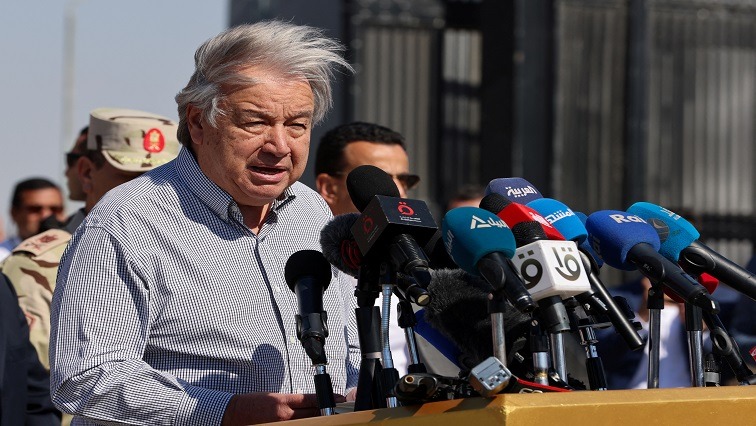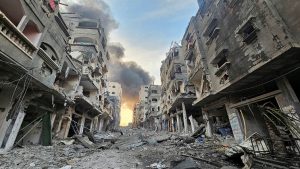The United Nations Secretary General has appealed directly to the Government of Israel to stop any escalation in Rafah, Gaza, and engage constructively in ongoing diplomatic talks towards a hostage for a ceasefire deal.
Addressing the media in New York, Antonio Guterres appealed to both Israel and Hamas to show political courage and spare no effort to secure an agreement immediately.
He also called for the immediate reopening of the Rafah and Karem Shalom crossings – key entry points for desperately needed humanitarian aid into the enclave after Israeli forces seized control of the Gaza side of the Rafah border crossing with Egypt.
“It would be tragic if weeks of intense diplomatic activity for peace in Gaza, yield no ceasefire. No release of hostages. And a devastating offensive in Rafah. I reiterate my appeal for both parties to show political courage and spare no effort to secure an agreement now. To stop the bloodshed. To free the hostages. And to help stabilize a region which is still at risk of explosion. This is a crucial opportunity that the region – and indeed the world – cannot afford to miss. Yet things are moving in the wrong direction. I am disturbed and distressed by the renewed military activity in Rafah by the Israeli Defence Forces,” Guterres said.
UN Chief urges Israel to halt offensive in Rafah
With Hamas on Monday agreeing to a three-phased deal that includes a ceasefire and hostage-for-prisoner swap, initial indications from Israeli officials were that the agreement was a no-go because the terms were inconsistent with Israel’s demands – as it now prosecutes a military offensive in Rafah that again places diplomatic and humanitarian efforts in jeopardy.
The UN Chief warned that the closure of the Rafah and Karem Shalom crossings was damaging to an already dire humanitarian situation with international aid groups warning that the actions had virtually cut off Gaza from outside aid.
“They must be re-opened immediately. Just to give an example; we risk running out of fuel this evening. I urge the Government of Israel to stop any escalation and engage constructively in the ongoing diplomatic talks. After more than 1,100 Israelis were killed in the Hamas terror attacks of 7 October … after more than 34 000 Palestinians were killed in Gaza, haven’t we seen enough? Haven’t civilians suffered enough death and destruction? Make no mistake – a full-scale assault on Rafah would be a human catastrophe. Countless civilian casualties. Countless more families were forced to flee yet again – with nowhere safe to go. Because there is no safe place in Gaza.”
Rafah, a city in southern Gaza with a population of 275 000 before the war, has since been sheltering over 1.2 million people displaced from other parts of Gaza, many now living in sprawling tent cities and largely reliant on humanitarian aid.
Guterres explained, “The repercussions will be felt far beyond, in the occupied West Bank, and across the region. Rafah is the epicenter of humanitarian operations in Gaza. Attacking Rafah will further upend our efforts to support people in dire humanitarian straits as famine looms. International humanitarian law is unequivocal: civilians must be protected – whether they leave Rafah or stay in the city. International humanitarian law must be respected by both parties. I also remind Israel of its obligation to facilitate the safe and unimpeded access of humanitarian aid and staff into and across Gaza. Even the best friends of Israel are clear: An assault on Rafah would be a strategic mistake, a political calamity, and a humanitarian nightmare.”
Israel-Hamas War | Appeal to Israel, Hamas to work on a resolution deal:
Guterres further appealed to those countries with influence over Israel to do everything in their power to avert even more tragedy in Gaza.
The UN SG further emphasised that it was time for the parties to seize the opportunity to secure a deal for the sake of their own people.
The White House earlier indicated that ceasefire negotiations, along with mediators Qatar and Egypt, were continuing with parties in Egypt’s capital Cairo on Tuesday where the terms of the ceasefire deal will be further thrashed out – in what Guterres called a decisive moment for the Palestinian and Israeli people and for the fate of the entire region.






